-
Compliance and audit reviews
From mandates, best practice procedures or accreditations, to simply gaining peace of mind, our technical and industry experts have you covered.
-
External audit
Strengthen business and stakeholder confidence with professionally verified results and insights.
-
Financial reporting advisory
Deep expertise to help you navigate New Zealand’s constantly evolving regulatory environment.
-
Corporate tax
Identify tax issues, risks and opportunities in your organisation, and implement strategies to improve your bottom line.
-
Indirect tax
Stay on top of the indirect taxes that can impact your business at any given time.
-
Individual tax
Preparing today to help you invest in tomorrow.
-
Private business tax structuring
Find the best tax structure for your business.
-
Tax disputes
In a dispute with Inland Revenue or facing an audit? Don’t go it alone.
-
Research & development
R&D tax incentives are often underused and misunderstood – is your business maximising opportunities for making claims?
-
Management reporting
You’re doing well, but could you be doing even better? Discover the power of management reporting.
-
Financial reporting advisory
Deep expertise to help you navigate New Zealand’s constantly evolving regulatory environment.
-
Succession planning
When it comes to a business strategy that’s as important as succession planning, you can’t afford to leave things to chance.
-
Trust management
Fresh perspectives, practical solutions and flexible support for trusts and estate planning.
-
Forecasting and budgeting
Prepare for every likely situation with robust budgeting and forecasting models.
-
Outsourced accounting services
An extension of your team when you need us, so you can focus your time, energy and passion on your business.
-
Setting up in New Zealand
Looking to set up a business in New Zealand? You’ve come to the right place.
-
Policy reviews & development
Turn your risks into strengths with tailored policies that protect, guide and empower your business.
-
Performance improvement
Every business has untapped potential. Unlock yours.
-
Programme & project management
Successfully execute mission-critical changes to your organisation.
-
Strategy
Make a choice about your vision and purpose, where you will play and how you will win – now and into the future.
-
Risk
Manage risks with confidence to support your strategy.
-
Cloud services
Leverage the cloud to keep your data safe, operate more efficiently, reduce costs and create a better experience for your employees and clients.
-
Data analytics
Use your data to make better business decisions.
-
IT assurance
Are your IT systems reliable, safe and compliant?
-
Cyber resilience
As the benefits technology can deliver to your business increases, so too do the opportunities for cybercriminals.
-
Virtual asset advisory
Helping you navigate the world of virtual currencies and decentralised financial systems.
-
Virtual CSO
Security leadership and expertise when you need it.
-
Debt advisory
Raise, refinance, restructure or manage debt to achieve the optimal funding structure for your organisation.
-
Financial modelling
Understand the impact of your decisions before you make them.
-
Raising finance
Access the best source of funding for your business with a sound business strategy and rigorous planning.
-
Business valuations
Valuable decisions require valued insights.
-
Complex and international services
Navigate the complexities of multi-jurisdictional insolvencies.
-
Corporate insolvency
Achieve fair and orderly outcomes if your business – or part of it - is facing insolvency.
-
Independent business review
Is your business viable today? Will it be viable tomorrow? Give your business a health check to find out.
-
Litigation support
Straight forward advice from trusted advisors to support litigation and arbitration matters, expert determinations and other specialist hearings.
-
Business valuations
Valuable decisions require valued insights.
-
Forensic accounting & dispute advisory
Understand the true values, numbers and dollars at stake, as well as your obligations and rights to ensure value is preserved and complexities are managed.
-
Expert witness
Our expert witnesses analyse, interpret, summarise and present complex financial and business-related issues which are understandable and properly supported.
-
Investigation services
A fast and customised response when misconduct occurs in your business.
The traditional procurement process is a tried and true one. We see it in government and in industry and across projects, services, and goods. For many years, it has been fairly mechanical: put out an RFP, make sure the proposals tick all the boxes, then pick the vendor in the middle, or the one with the lowest price, or the one you wanted to begin with.
That system has been producing steady results for a long time – although “results” usually means making each supplier grind down prices by a tiny fraction. The price is reasonable, the boxes are ticked … and then it’s on to the next job.
Unfortunately, this type of procurement process is on its last legs. There are two reasons. First, the easy gains have already been achieved. You can only shave off prices so many times before suppliers’ margins no longer justify the time and effort required to achieve them.
Second, many commentators, including me, have warned that this type of procurement is likely to be automated out of existence – and soon; there’s no reason why the boxes can’t be ticked by a bot.
Hopefully, that will leave procurement professionals with extra time to focus on more important parts of the process, which incidentally, doesn’t include the sourcing part of procurement. It may come as a surprise to some, but this is arguably the least important aspect. Sourcing is the middle stage of three: the first is planning and the third is managing. These are the steps with the most potential to add enormous value to an organisation.
Governments and shareholders are always asking their organisations to deliver more with less – to reach higher levels of innovation and to get to market quicker. These achievements aren’t always possible, but when they are, a strong procurement capability can be one of the keys to success.
The government’s latest procurement statistics are a mixed bag of good news and bad. The good news is that procurement is improving overall after many years of sustained effort across the public sector, and this should be commended. The bad news lies within three themes that jumped out at me from the data:
- Suppliers and agencies don’t talk enough
- When they do talk, agencies don’t ask for improvements and suppliers’ ideas are usually ignored
- The competencies required to maximise value across the procurement cycle are slipping; too few people have a thorough understanding of how to get the most out of the process
1. Suppliers and agencies don’t talk enough
Only 49 percent of government suppliers have regular contract review meetings – this figure jumps to 69 percent in the services sector. How can you manage your performance or gauge what is desired if it’s not discussed? The following graphs tell the story.
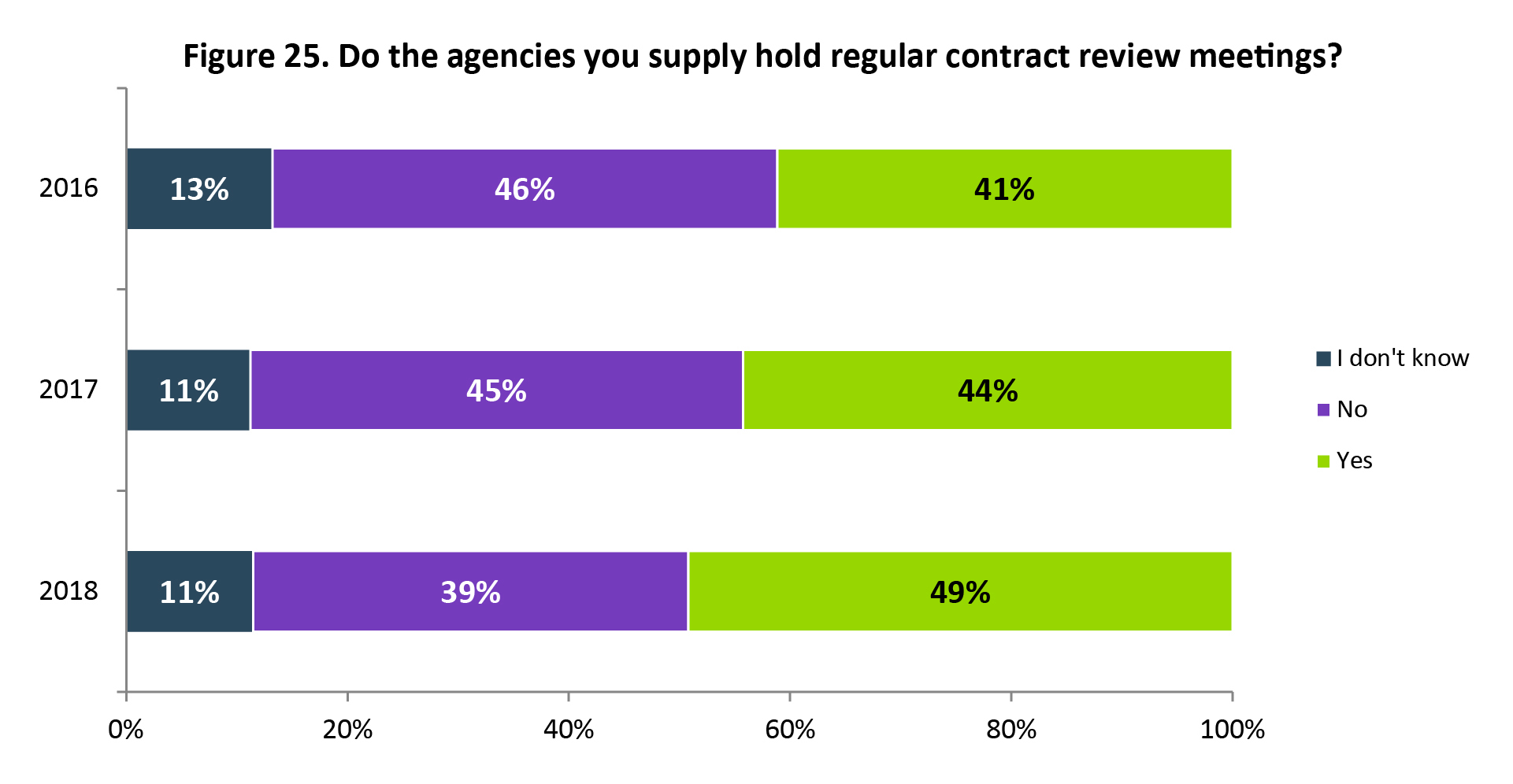
Source: New Zealand Government Procurement Business Survey 2018
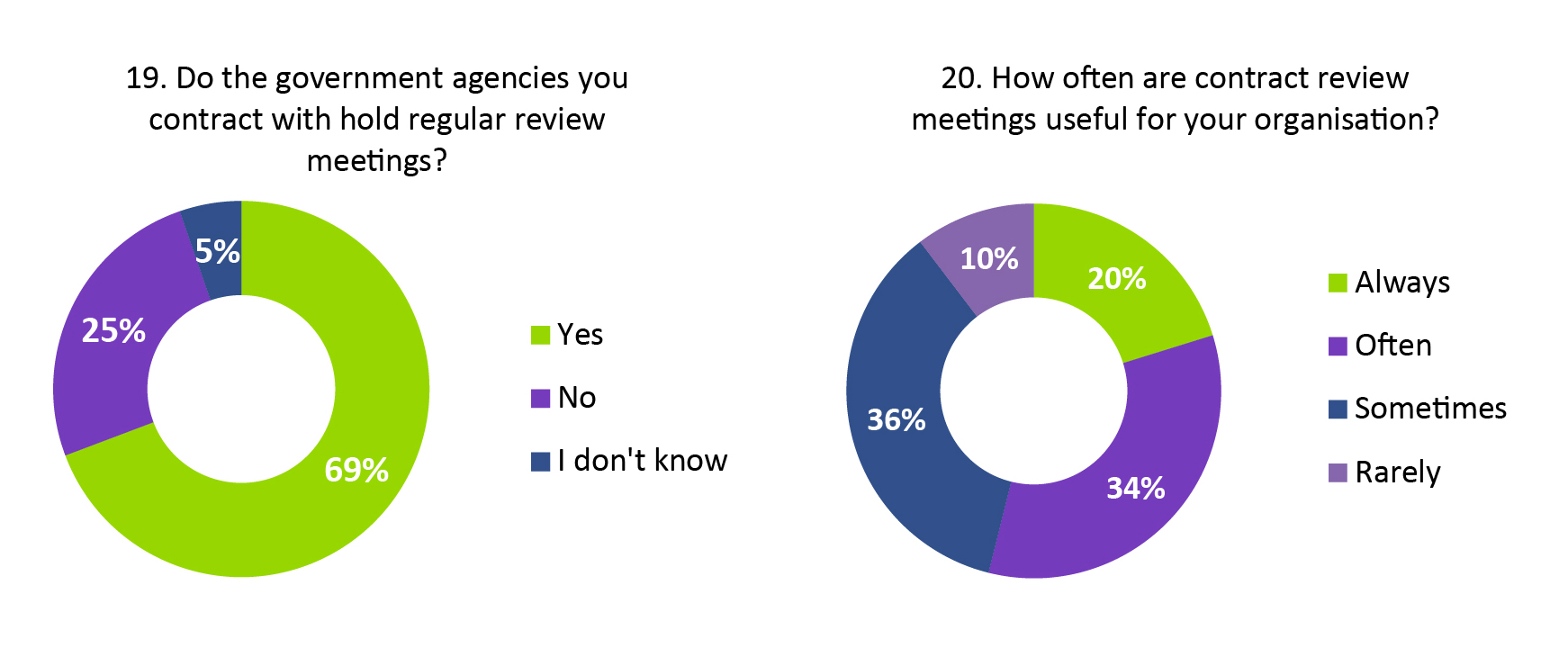
Source: New Zealand Government Procurement Business Survey 2018: Community service providers
2. Agencies don’t ask for improvements
How often do agencies ask for improvements? The following table shows that there’s only a small percentage in the “sometimes”, “often”, and “always” categories. It means that 60–80 percent of suppliers aren’t being asked about improvements. If that’s an accurate inference, a massive opportunity is being missed.
Similarly, the data indicates that 70–90 percent of the time, supplier ideas are not adopted. What might this mean? Are suppliers’ ideas really that bad? If so, they’re the wrong supplier. In our experience, it’s more likely that the ideas might be solid, but there are no mechanisms to capture them. It’s also possible that principals have limited time or perhaps have a low appetite for analysing and considering the ideas.
Without these preliminary steps, agencies can’t implement suggestions from the experts they’re engaging to add value.
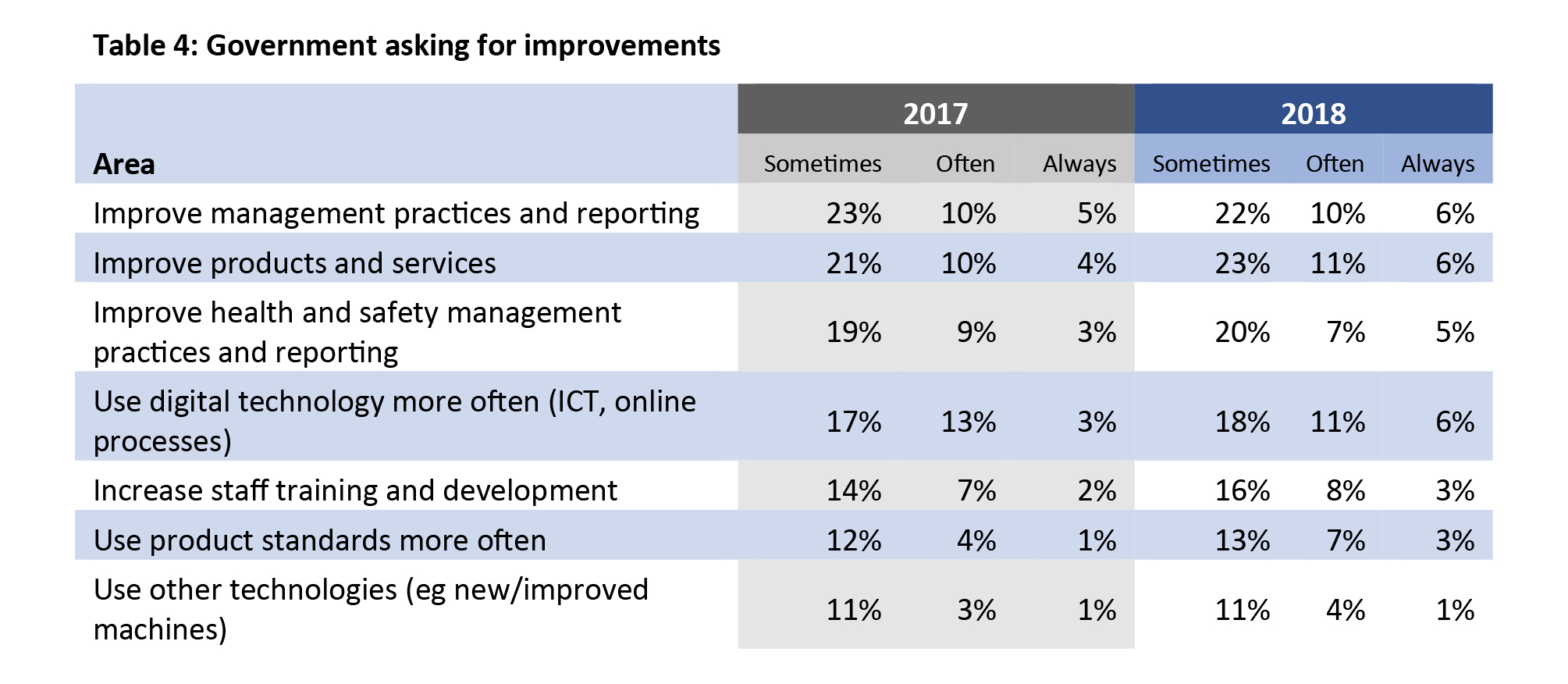
Source: New Zealand Government Procurement Business Survey 2018: Community service providers
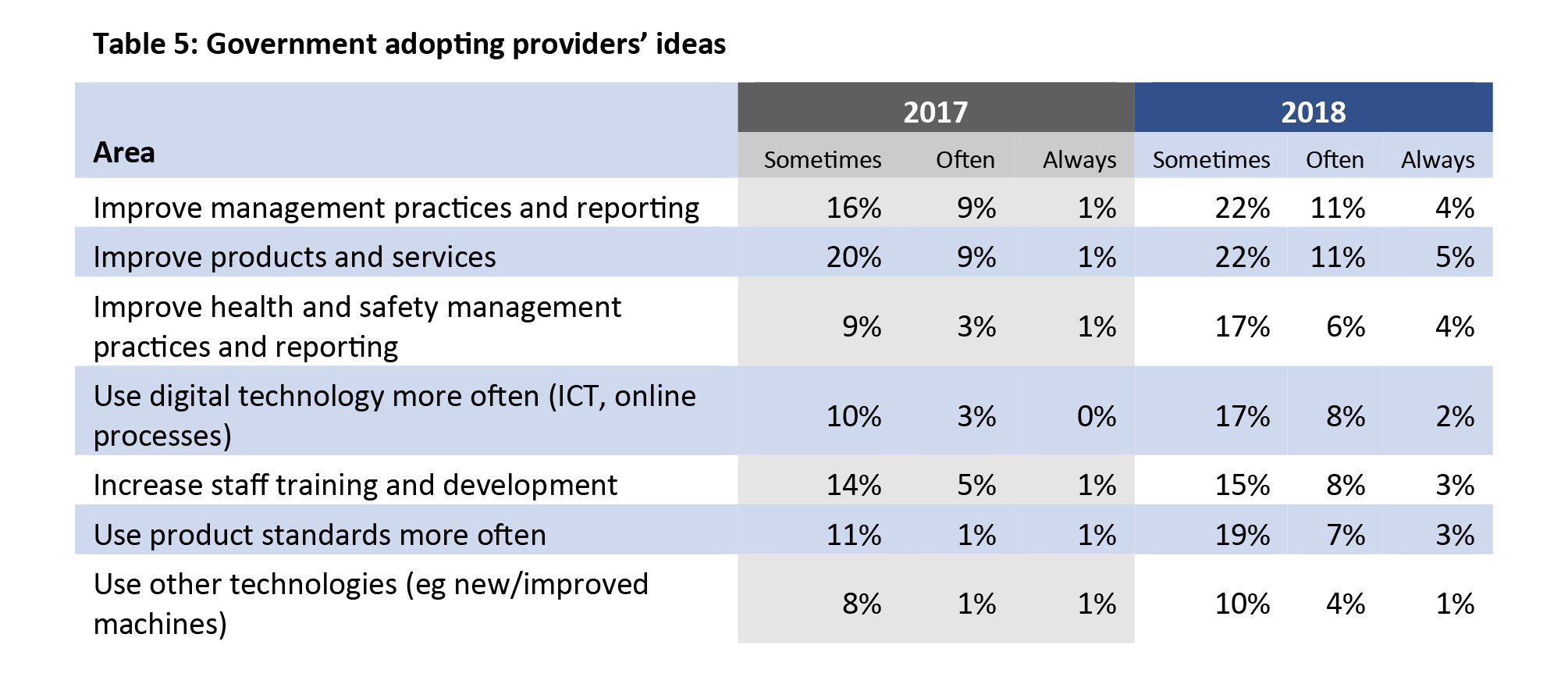
Source: New Zealand Government Procurement Business Survey 2018: Community service providers
3. The competencies are slipping
We know the critical competencies to capture new forms of value or to receive and nurture a good supplier idea: openness to innovation, quality decision making, and finding ways to incentivise performance. Yet these are the three weakest of the six competencies in both surveys.
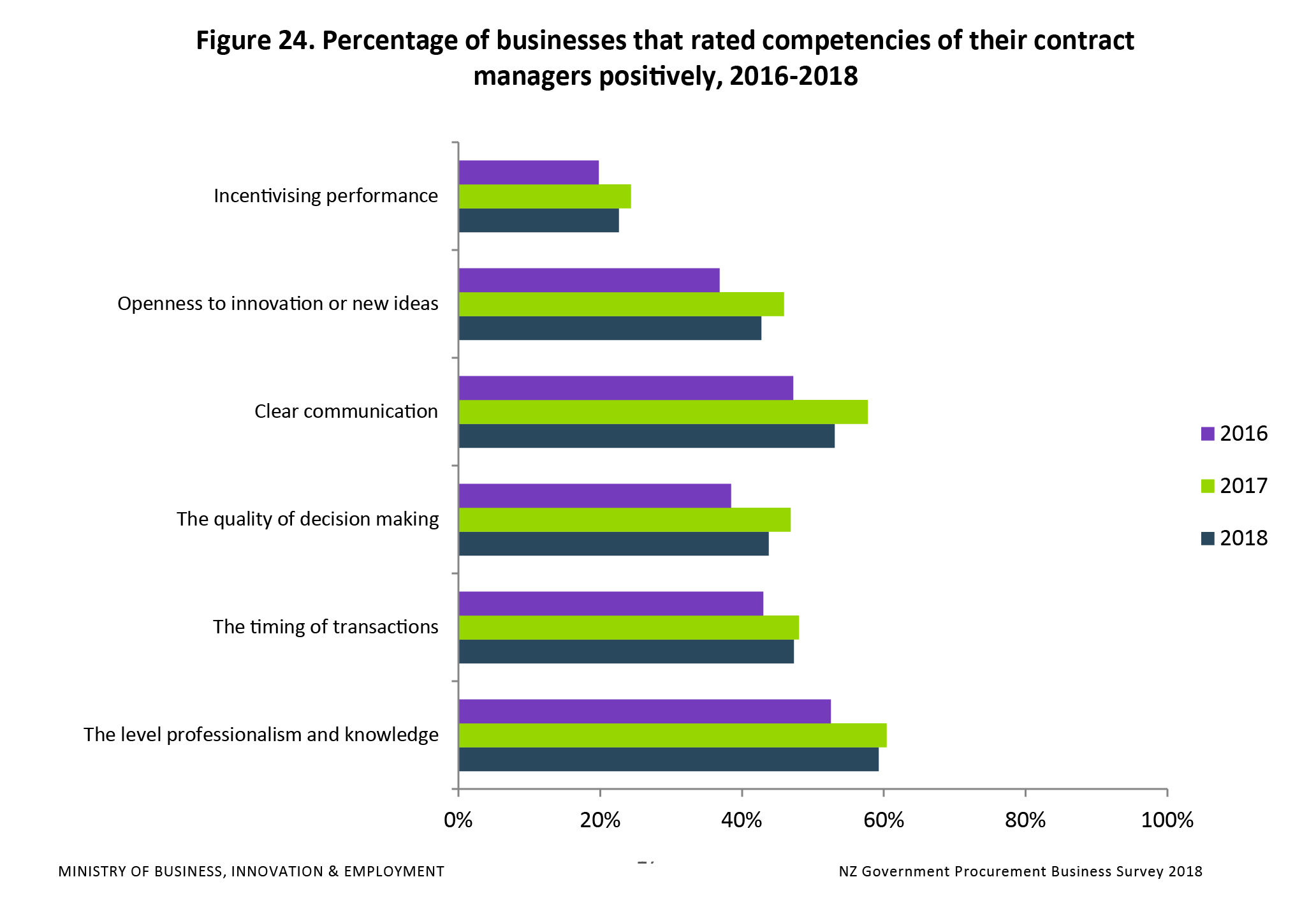
Source: New Zealand Government Procurement Business Survey 2018
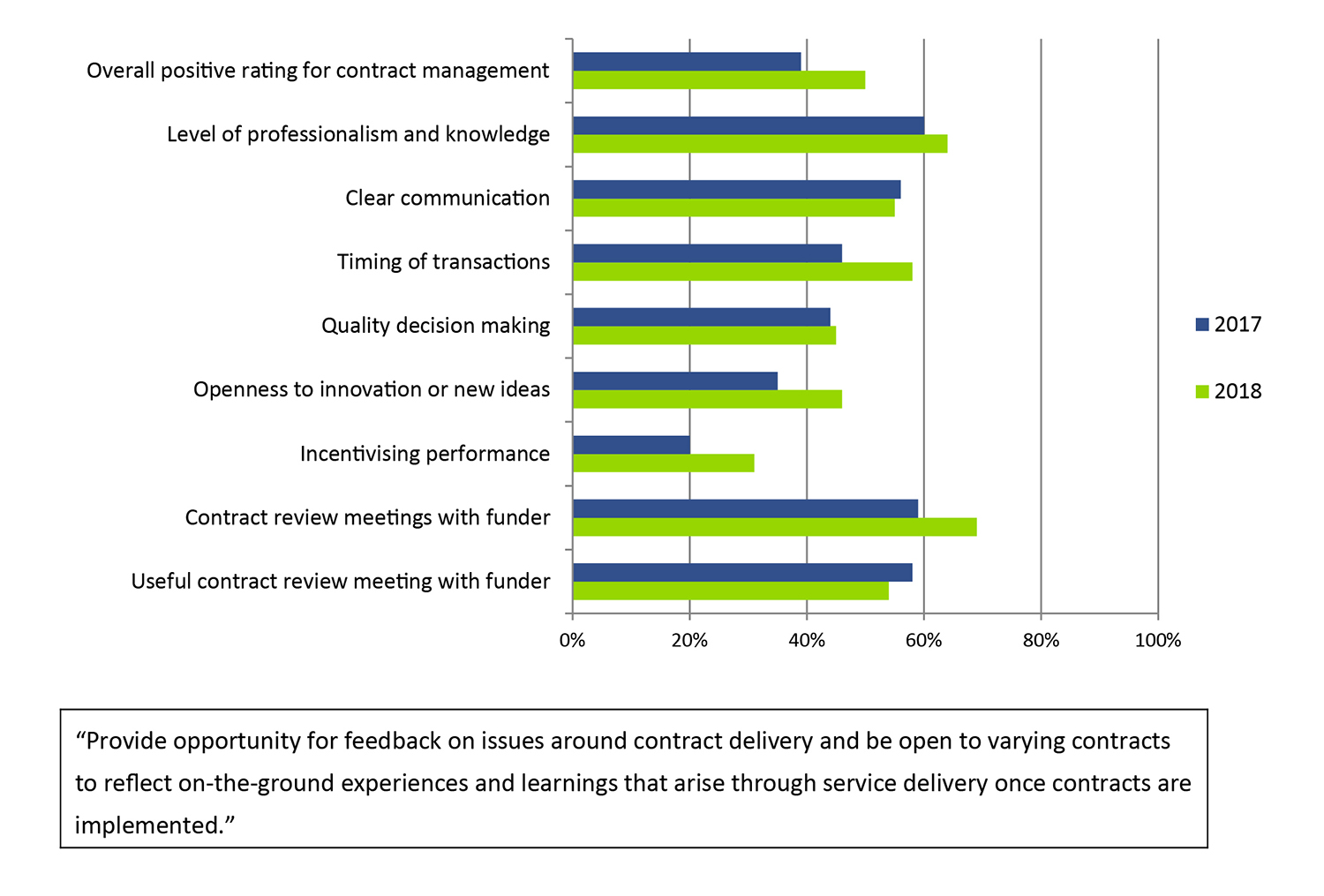
Source: New Zealand Government Procurement Business Survey 2018: Community service providers
We often see clauses that indicate a willingness to receive innovative ideas during the term of the contract, but organisations have no defined process to capture and manage them. It might be written in a contract, but when it comes down to it, it’s all about who has the control and how suppliers are being measured – the box ticking stifles innovation. We’ve seen commercial acumen and bright ideas fail because of the constraints of the procedures, policies, or even the organisation itself.
What needs to change?
There’s good news – there are some relatively easy fixes for all three of these challenges. The public-sector clients that we have been working with over the last few years have recognised a gap in procurement process competency, and many are working to leverage what is often referred to as the “commercial” capability of the team. Sometimes it’s a new hire; sometimes it’s tapping into existing personnel with more training (although both approaches have their limits). Making sure the procurement team asks the right questions and listens to ideas should be relatively simple with the right methodology.
A pragmatic approach works best:
- Grab what commercial expertise you can from within. Aim for an open-minded team that represents the diversity of the business; diversity and openness encourage innovation
- Add some external expertise to your team – you need strong methodologies to achieve more innovation in supplier partnerships. You also need to know what a smart contract really looks like (here’s a hint: quite unlike many of the ones we see)
- Put in place the right leadership. Yes, this will include the right governance, but it’s more than that. Standardisation and support for change management are as critical as knowing who owns the initiative. Creating the right environment is essential: the best environment is a collaborative culture coupled with the ability to resolve differences of opinion and reach an effective decision. This is usually not in the project management manual
There will always be boxes to tick, and no agency can overlook the mechanical aspects of the procurement process, whether you’re buying toilet paper or nuclear reactors. You can’t throw out the rule book. But neither should the rule book extinguish the sparks of good ideas that can drive better results for all stakeholders.
